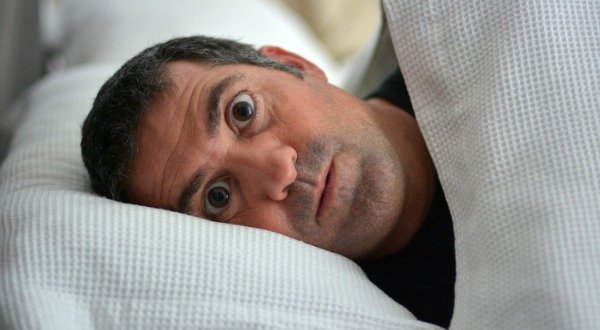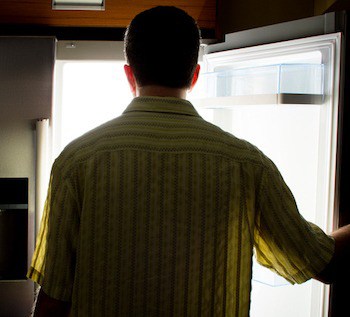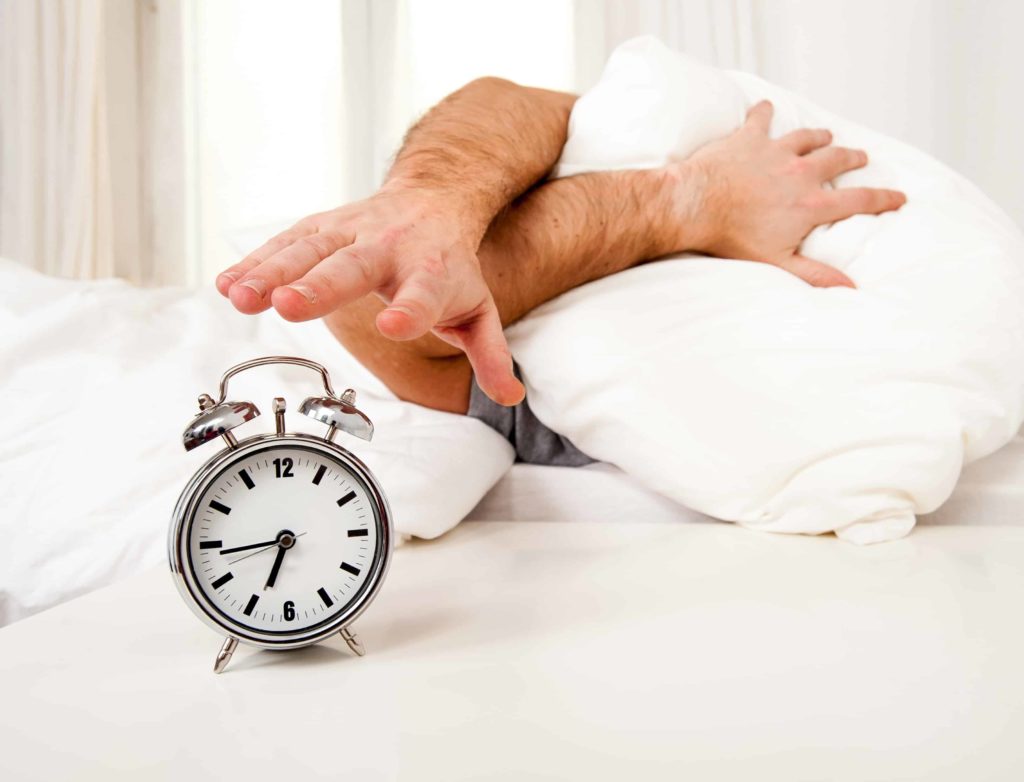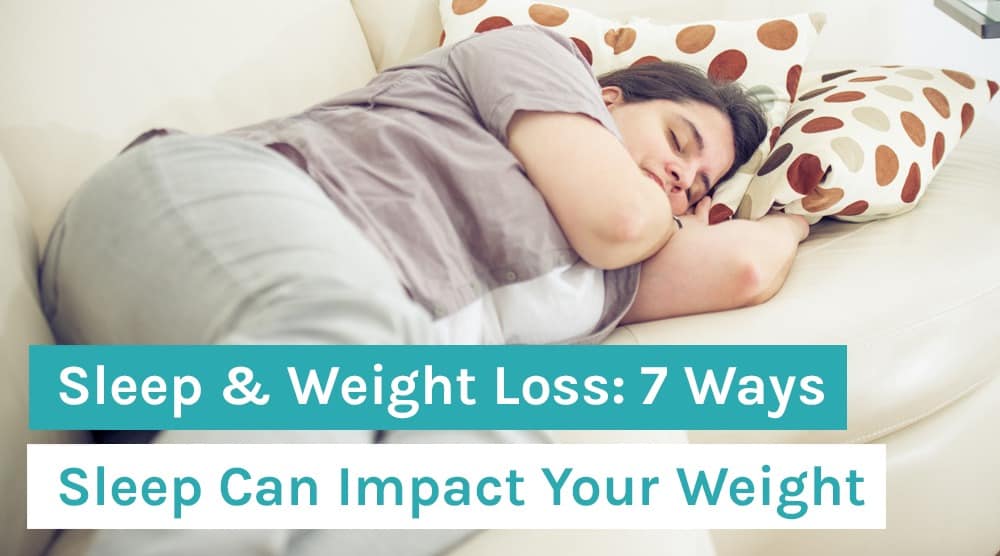Sleep & Weight Loss: 7 Ways Sleep Can Impact Your Weight
In a hurry? Click here to read the Article Summary...
Ahh, sleep. When we get enough of it, it feels so good. And when we don’t, well, most of us know what that feels like too. But can a lack of quality sleep actually cause you to put on pounds? (And conversely, can good sleep help you lose weight?) Read on to discover the surprising connection between sleep and weight loss.
1 in 3 Americans Are Sleep Deprived

Let’s face it. The majority of us burn the candle at both ends. According to the Centers for Disease Control and Prevention, a whopping 30% [1] of American adults consistently survive on 6 hours of sleep or less. That means that one out of every three Americans walking around today is sleep deprived!
But even if you are in bed seven to nine hours a night [2], how do you know if you are getting good quality sleep?
What Is a Good Night’s Sleep?
Definitions of a good night’s sleep vary depending on who you talk to. Ask a neurologist and they may describe how quality sleep is dependent on the amount of non-REM, or deep sleep, you get. This is the “rest and repair” stage of sleep when the body has a chance to take care of business, so to speak, and rejuvenate many major organs.

Just what constitutes quality sleep can be subjective amongst laypeople as well and is dependent on needs and lifestyle.
Some people would say if they have a great dream, they know they have gotten quality sleep. Others know they rested well when they’re not tired the next day and are in a good mood. Most people simply “know it when they feel it.”
In general, however, it’s a safe bet that you got a good night’s rest when you:
- fall asleep within 30 minutes of hitting the pillow
- wake up no more than once during the night
- are in bed for 7 to 9 hours and are asleep at least 85% of this time [3]
- wake up rested in the morning [4]
- are not groggy or sleepy during the day
Anything less (or more) than the above throws the body off balance. When poor sleep becomes chronic, this is when some pretty nasty health effects – including weight gain – start to kick in.
The Sleep-Weight Loss Connection

We could write a whole book on the consequences of not getting enough quality sleep.
This article, however, is for those who are working to lose weight or maintain their current weight and want to understand sleep and weight loss so they can use the power of the pillow to help them do that in a healthy way.
To that end, current research absolutely indicates a connection between lack of sleep and obesity [5], although it appears that there is not just one cause for this. To dive into the connection more deeply, here are 7 ways that sleep impacts weight loss and/or gain:
7 Ways Sleep Can Impact Your Weight
#1 – Poor Sleep Stimulates Appetite Hormones. This, unfortunately, makes you want to eat more. The connection has to do with two hormones, in particular – leptin and ghrelin – which regulate hunger.

Leptin is what makes you feel full while ghrelin stimulates hunger (just remember the “grrrr” in ghrelin to help you remember the difference).
When the body is short on sleep, ghrelin levels rise in the body and you may feel hungry even if you just ate. At the same time, leptin levels go down, which adds to the feeling of not being satiated.
#2 – Poor Sleep Leads to Poor Judgement. When you don’t get enough sleep, you don’t perform your best. We have all experienced this: we just aren’t as sharp or as quick when we’re sleep-deprived.
The brain needs sleep to maintain neural pathways that help us to learn, create memories, concentrate, and respond to our environment. Sleep also plays a role in removing toxins from the body, including neurotoxins in the brain.
Because of all this, we tend to not make the best choices when it comes to just about everything when we’re sleep-deprived, including what we put in our mouths and when. One example is that food eaten late at night is more likely to be stored as fat, instead of burned as fuel during the day [6].

#3 – Being Sleep Deprived Makes You Crave Carbs and Fat. Lack of sleep also leads to an imbalance in levels of cortisol. This, in turn, may increase the body’s need for serotonin, an important neurotransmitter linked to both mood and appetite.
Turning up the volume on the body’s need for serotonin can increase cravings for carbs and fat, since eating these foods will lead to the release of serotonin [7].
#4 – Sleep Deprivation Can Cause Stress. Lack of sleep can lead to heightened stress and even anxiety disorder, according to a 2013 Japanese study [8].
The connection has to do with how “sleep debt” affects a part of the brain called the amygdala’s response to “negative emotional stimuli.” Of course, research proving the connection between stress and weight gain is as voluminous as that for sleep and weight gain.
Stress also increases cortisol in the body, kicking in the same vicious cycle mentioned above with regard to serotonin. In addition, stress can increase our overall appetite, make the body hold on to fat more and wear away at our will to stay healthy and lose weight.

A 2006 survey [9] conducted in part by the National Women’s Health Resource Center found that 47% of Americans over age 18 are concerned with the amount of stress in their lives.
The survey also found that people who experience chronic stress are more likely to experience hypertension, anxiety, depression, and obesity. This is due, in large part, to the unhealthy habits, such as emotional eating, that come with being stressed out.
#5 – Lack of Sleep Encourages the Body to Store Calories as Fat. Again, the culprit here is cortisol, as well as insulin. Both of these hormonal substances are vital for certain functions in the body, but when the balance is off because of lack of sleep or stress, they can signal the body that it’s time to “store up.”

Lack of sleep can especially lead to increased abdominal fat or “belly fat.” A 2014 report published in the journal Obesity monitored healthy adults for six years and found that the people who consistently got between 7 to 8 hours of sleep a night had less “visceral fat mass” than those who slept less than 6 hours a night [10].
#6 – Poor Sleep Can Slow Your Metabolism. Metabolism is the mechanism that helps convert calories from food to energy for the body. Lack of sleep or poor, restless sleep leads to less effective metabolic functioning. According to studies conducted at UCLA [11], among others, sluggish metabolism caused by lack of sleep will not utilize calories as efficiently as it should. The result is calories stored as fat!
#7 – Genetic Disposition. Finally, some studies on fraternal and identical twins, including a 2012 investigation conducted at the University of Washington [12], show that sleep deprivation may promote the expression of genes connected to obesity for those who have them.
Healthy Sleep, Not Narcorexia, Helps You Lose Weight
Believe it or not, there is actually a fad diet going around called the “Sleeping Beauty Diet [13].” This is where excessive sleeping, sometimes up to 20 hours a day, is specifically used to snooze through meals and lose weight.

Just to be clear, this is NOT what we are talking about when it comes to sleep and weight loss.
Excessive sleeping specifically for the purpose of weight loss may be an indication of a serious eating disorder, especially if the use of sleeping pills is involved. In fact, the new term “narcorexia” denotes just that.
The fact is that excessive sleeping can be just as detrimental to the body and mind as not enough sleep can be. The risks for actual weight gain [14], even obesity, are the same. In addition, people who sleep more than 10 hours a day may be prone to other issues, such as memory problems, depression and anxiety, inflammation and body pain, heart disease [15], and a higher risk of death in general.
To reiterate, the BEST outcomes for your health and your weight come from getting those solid 7 to 9 hours of ZZZs every night, night after night.
Still not convinced? Check this out. A mini-study conducted by Glamour magazine [16] had 7 women who were slightly overweight do only one thing different for 10 weeks: get 7 to 9 hours of quality sleep each night. Overall, the total pounds lost was between 7 to 21 each!
Tips If You Can’t Sleep

Of course, sometimes no matter what we do, our eyes may shut but our brain keeps on moving, sometimes deep into the night. The reasons why a person may suffer from insomnia or poor sleep quality are as diverse as the individual sufferer.
For most people, however, sleep issues often come down to one of these basic things:
- too much caffeine
- too much alcohol
- too large of a meal before bed
- chronic pain or disease
- medications
- bad environment (noise, temperature, etc.)
- anxiety, depression or other psychological disorders
- exposure to blue light (from computer, phone, or TV screens) right before bed
- smoking (i.e., nicotine)
- nighttime exercise
- stress
If you’re committed to getting a good night’s sleep and don’t quite know where to start, try this rule of thumb put out by the online news service, News.Com.Au [17].
It’s called the “10-3-2-1-0 Rule” and it goes like this. Ten hours before you go to bed, stop drinking caffeine. Three hours before bed, stop eating. Two hours before bed, stop working. One hour before bed, stop looking at computer or TV screens.
The zero in the sequence indicates the
number of times they say you’ll wake up in the middle of the night if you
follow these rules consistently!
Magnesium deficiency is linked to stress, diabetes, heart disease, osteoporosis, chronic fatigue syndrome, depression, anxiety, trouble sleeping, sore muscles, migraines, and many more debilitating health conditions.
If your body needs magnesium, you want the most beneficial kind your body can actually absorb. Organixx Magnesium 7 gives you seven (7) of the very best, most bioavailable types of elemental magnesium available.

 Sources:
Sources:
Article Summary
30% of American adults consistently survive on 6 hours of sleep or less per night.
What constitutes quality sleep can be subjective and is dependent on needs and lifestyle.
Current research absolutely indicates a connection between lack of sleep and obesity.
There are at least 7 ways that sleep impacts weight loss and/or gain:
- Poor Sleep Stimulates Appetite Hormones
- Poor Sleep Leads to Poor Judgement
- Being Sleep Deprived Makes You Crave Carbs and Fat
- Sleep Deprivation Can Cause Stress
- Lack of Sleep Encourages the Body to Store Calories as Fat
- Poor Sleep Can Slow Your Metabolism
- Genetic Disposition.
There is actually a fad diet called the “Sleeping Beauty Diet which encourages excessive sleeping (up to 20 hours/day) to snooze through meals and lose weight.
Excessive sleeping specifically for the purpose of weight loss may be an indication of a serious eating disorder, especially if the use of sleeping pills are involved. There is a new term “narcorexia” to describe this disorder.
The BEST outcomes for your health and your weight come from getting a solid 7 to 9 hours of sleep every night.





Hello,
I clicked on the link to "sign up" for your newsletter and didn't see anywhere to add my information for sending it. What should I do?
Hi Stephanie,
We're sorry to hear that you were having some trouble signing up for our newsletter.
Try this link to sign up: https://organixx.com/33-superfood-smoothie and receive a free recipe e-book as our gift to you.
We hope this helps. Thanks for being here with us. Wishing you a happy & healthy day.
I just bought the cleanse products and saw something about using one first, but I don’t remember which.
My skin and scalp are very itchy and irritated now and the dermatologist doesn’t know why. I’m hoping your cleanse will help.
Hi.... I wish to subscribe to your newsletters.....thank you
Hi Darlene, thank you so much for your interest.
You may sign up for our newsletter here: https://organixx.com/free-health-newsletter/
Hope this helps! Wishing you a fantastic day!
I lost 25 lbs without going on a diet in about 4 weeks and weighing at that time and not exercising
and eating less bread and eating less fried foods and drinking smoothies and discovered drinking orange juice caused spots all over my body and 4 doctors did not know the reason why.
I am a senior and the correct weight now and feeling good exercising once a week now.
That sounds wonderful, William! You did an excellent job in hitting your goal weight, developing healthy eating habits, and on staying active. Keep it up!
Thank you for sharing your story with us and we wish you the best in your wellness journey!